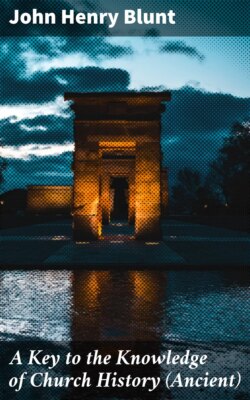Читать книгу A Key to the Knowledge of Church History (Ancient) - John Henry Blunt - Страница 14
На сайте Литреса книга снята с продажи.
Section 9. Results of St. Stephen's Martyrdom.
ОглавлениеTable of Contents
A.D. 34. Good brought out of evil for the Church.
We may here pause to recollect how God had all along been bringing forth good out of seeming evil, in what concerned His Church. The first dawnings of persecution drew down increased "boldness" in answer to thankful prayer; the first great necessity for exercising the judicial office of the Church was followed by "great fear" and multiplied conversions, as well as by the first miracles of healing wrought in the Church; the first schism was the occasion of the origin of the Order of Deacons, directly after which event we hear of "a great company of the priests being obedient to the Faith," the first martyrdom helped to bring about the conversion of the chief persecutor; and now the first general persecution which came upon the Church was to have for its result a far more widely-spread diffusion of the knowledge of the Kingdom of God than had before taken place.
Extension of the Church according to our Lord's promise.
This extension of the Church was in exact accordance with our Lord's words to His Apostles just before His Ascension, that they should be witnesses unto Him "in Jerusalem, and in all Judea, and in Samaria, and unto the uttermost parts of the earth." Jerusalem was already "filled with" their "doctrine," and now the disciples were "scattered abroad throughout the regions of Judea and Samaria," and "went every where preaching the Word[50]." Still confined to Jews, and Samaritans, or to proselytes. Still it would seem that they confined their preaching to such as were either Hebrews, or Grecians, i.e. foreigners more or less professing Judaism[51]; or, as in the case of the Samaritans, to such as were of mixed Jewish descent, and clung to the Law of Moses, though with manifold corruptions; or, again, to proselytes like the Ethiopian eunuch. The Apostles, we read, continued at Jerusalem, doubtless by God's command and under His special protection.
Conversion of Samaria.
The conversion of the despised city of Samaria was effected by the instrumentality of the Deacon St. Philip[52], whose preaching and miracles were followed by the baptism of large numbers of the people, and, amongst them, of one Simon of Gittum, better known as Simon Magus (i.e. the magician, or sorcerer), who had claimed supernatural powers, and given himself out to be an emanation from the Deity, or even God Himself. St. Peter and St. John sent to confirm. St. Philip, as a Deacon, could not complete the gift begun in Holy Baptism, and St. Peter and St. John were sent down by the Apostles from Jerusalem, that they might confirm the Samaritan converts by prayer and the Imposition of Hands. Confirmation in those early days of the Church was wont to be accompanied by a bestowal of miraculous gifts of the Holy Ghost; and the wondrous signs following upon this, the first Confirmation mentioned in God's history of His Church, led the still unbelieving Simon to long for the ability to confer similar powers. The unbelief of Simon Magus. He dared to offer money to the Apostles with this view, and drew from St. Peter such a reproof as for a time pierced through even the heart which had hardened by an abuse of holy things. But this penitence was of short duration. He became the author in the Church of a deadly heresy called Gnosticism, mixing up what he had learnt of the doctrines of Christianity with heathen philosophy and sinful living, and making pretence of being endowed with miraculous gifts. His end. This first heretic is said to have perished miserably whilst endeavouring to fly through the air at Rome[53], St. Peter praying at the same time that he might no longer be suffered to hinder the salvation of souls.
The Gospel preached in Antioch.
Another important result of the Sauline persecution was the preaching of the Gospel in the important city of Antioch by the Greek-speaking Jews who sought refuge there[54], and who addressed themselves to their Hellenist countrymen. It was in this city, the third in rank in the Roman Empire, and afterwards the mother of Gentile Christendom, that the first branch of the Church speaking Greek as its original tongue, was now beginning to have its foundation; and it was also here that the disciples were first called by the honourable name of Christians[55].
